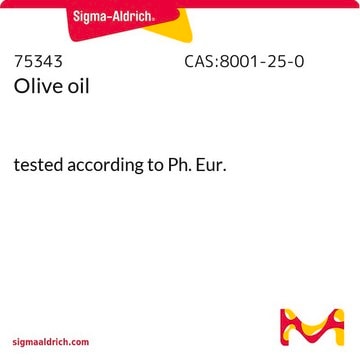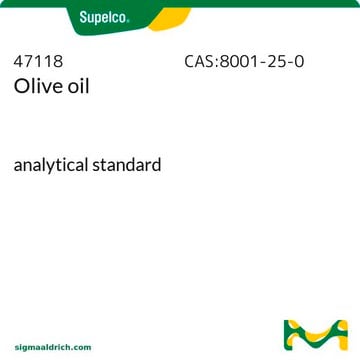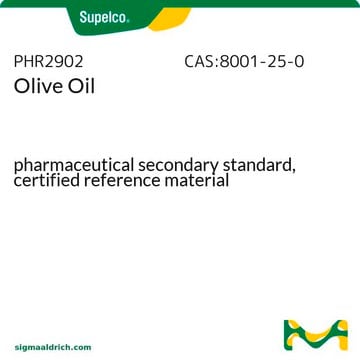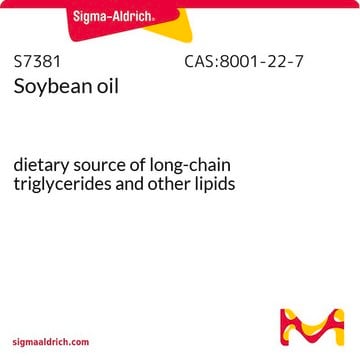Recommended Products
form
liquid
quality
highly refined, low acidity
density
D20/4, 0.895-0.924
functional group
ester
oleic acid
lipid type
oils
shipped in
ambient
storage temp.
room temp
Looking for similar products? Visit Product Comparison Guide
General description
Olive oil is rich in the phenolic component, squalene glucoside. The extra-virgin olive oil (VOQ) is antioxidant rich and a potential reactive oxygen scavenger. Olive oil is rich in monounsaturated long-chain fatty acids and is not prone to oxidation. Olive oil impairs xanthine oxidase activity and could have potential in modulating tumor progression. The biophenols in olive oil may elicit protection in metabolic disorders, cardiovascular diseases and neurodegeneration.
Application
Olive oil has been used as an oral supplement for metabolic phenotyping in mice . It has been used for dissolution of vitamin E, whey proteinand drugs.
Biochem/physiol Actions
The health benefits of olive oil result from its higher proportion of monounsaturated fats, as well as its antioxidant constituents: hydroxytyrosol, oleuropein and oleocanthal.
Storage Class
10 - Combustible liquids
wgk_germany
WGK 1
flash_point_f
235.4 °F - closed cup
flash_point_c
113 °C - closed cup
Certificates of Analysis (COA)
Search for Certificates of Analysis (COA) by entering the products Lot/Batch Number. Lot and Batch Numbers can be found on a product’s label following the words ‘Lot’ or ‘Batch’.
Already Own This Product?
Find documentation for the products that you have recently purchased in the Document Library.
Customers Also Viewed
The antioxidant/anticancer potential of phenolic compounds isolated from olive oil
Owen RW, et al.
European Journal of Cancer, 36(10), 1235-1247 (2000)
Pharma-nutritional properties of olive oil phenols. transfer of new findings to human nutrition
Crespo M, et al.
Foods (Basel, Switzerland), 7(6), 90-90 (2018)
Kyung-Taek Rim et al.
Safety and health at work, 6(3), 184-191 (2016-03-02)
Chemical mutagenicity is a major hazard that is important to workers' health. Despite the use of large amounts of allyl chloride, the available mutagenicity data for this chemical remains controversial. To clarify the mutagenicity of allyl chloride and because a
Enteroendocrine-derived glucagon-like peptide-2 controls intestinal amino acid transport
Lee J, et al.
Molecular Metabolism, 6(3), 245-255 (2017)
Dietary protein dilution limits dyslipidemia in obesity through FGF21-driven fatty acid clearance
Maida A, et al.
The Journal of Nutritional Biochemistry, 57(6), 189-196 (2018)
Our team of scientists has experience in all areas of research including Life Science, Material Science, Chemical Synthesis, Chromatography, Analytical and many others.
Contact Technical Service










